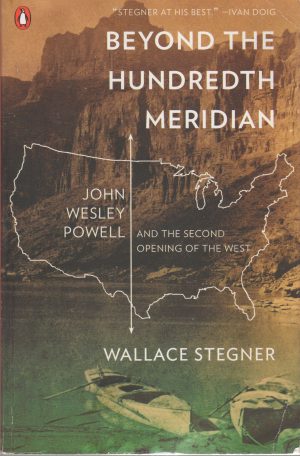
Beyond the Hundreth Meridian: John Wesley Powell and Second Opening of the West by Wallace Stegner (1992. Penguin. ISBN 9780140159943)
William Gilpin, a 19th century promoter of the settlement of the American West, is cast early on in this biography by great fiction writer Wallace Stegner (The Angle of Repose) as the fool, as the comedic foil to the steadfast, dedicated, determined teacher-turned explorer/ethnologist, Major John Wesley Powell:
If William Gilpin was enthusiastically part of his time, yapping in the van of the continentally confident, Major John Wesley Powell was just as surely working against the current of popular optimism in the policies he developed, and decades ahead of it in his vision. It was to be his distinction and in a way his misfortune that in an age of the wildest emotionalism and nationalistic fervor he operated on common sense, had faith in facts, and believed in system.
The major revelation that Powell’s journeys down the Colorado and through the Grand Canyon, to include exploration of the surrounding streams, rivers, creeks, buttes, mountains, and bluffs brought to the American public and the scientific community is this: The line being tossed to the frenzied schools of would-be Californians, Coloradians, Wyomingites, Arizonians, and Dakotans, that the West was a place of vast mineral resources, open land, tillable soil, and timber was only partly true. What, in Powell’s humble estimation, Gilpin and the other “boomers” left out was this: The vast majority of the American West between the Mississippi and the Rockies was arid and nearly impossible to farm. Water was the resource, not gold or silver or coal or timber, that would dictate how and where the West should be settled. It was Powell’s understanding of the ecological fragility of the vast plains, canyon lands, deserts, foothills, and mountains, and the necessity of protecting water for human consumption, that would drive American civilization beyond the 100th meridian.
To this end, Powell, as depicted by Stegner, worked his one-armed slender frame to the bone for nearly forty years of travel, research, and Congressional politicking, always begging and shucking and jiving for financial assistance to back his efforts. When, at the height of his powers, he was given the reigns of both the US Geological Survey, the first consolidated effort to map the entirety of the continental US, and also control of the Irrigation Survey-the bureau that was designated by Congress to set water rights and policies for the arid West-he urged Washington to adopt a socialistic view of water and water rights. Powell’s singular vision, that water in the American West was a resource that needed careful planning and protection, to include the establishment of an elaborate reservoir system to store the snow melt waters of the Colorado and other major Western rivers during the spring for the heat and dry months of the summer (see https://en.wikipedia.org/wiki/Lake_Powell) ) eventually came to fruition but not without the downfall of its promoter. In the end, Powell’s push for communal farming and water use, which included a ban on new settlement and development while his surveys were being completed (much to the chagrin of Senators and Congressmen from the affected states), was his demise. But Major Powell’s careful research and study of the natural world in Colorado, Utah, and Arizona, including the detailed analysis and categorization of the indigenous people, their languages and cultures, was the work of dedication and tenacity that no politician could defeat.
I picked this book up at the gift shop on the south rim of the Grand Canyon because I believed it simply chronicled Powell’s desperate and dangerous rafting trips down the Colorado. But that was a mistake: This book, written by one of the 20th century’s best American fiction writers, is so much more than an adventure story. It is, as the wild fires rip through our beloved West, a prophecy of things that have come to pass. I don’t think it’s difficult to decipher what Powell might think, looking down from the heights of heaven, to see Phoenix and Las Vegas and Denver using potable water to green up lawns and golf courses.

4 and 1/2 stars. A must read for anyone concerned about the future of development in the West.
Peace.
Mark


